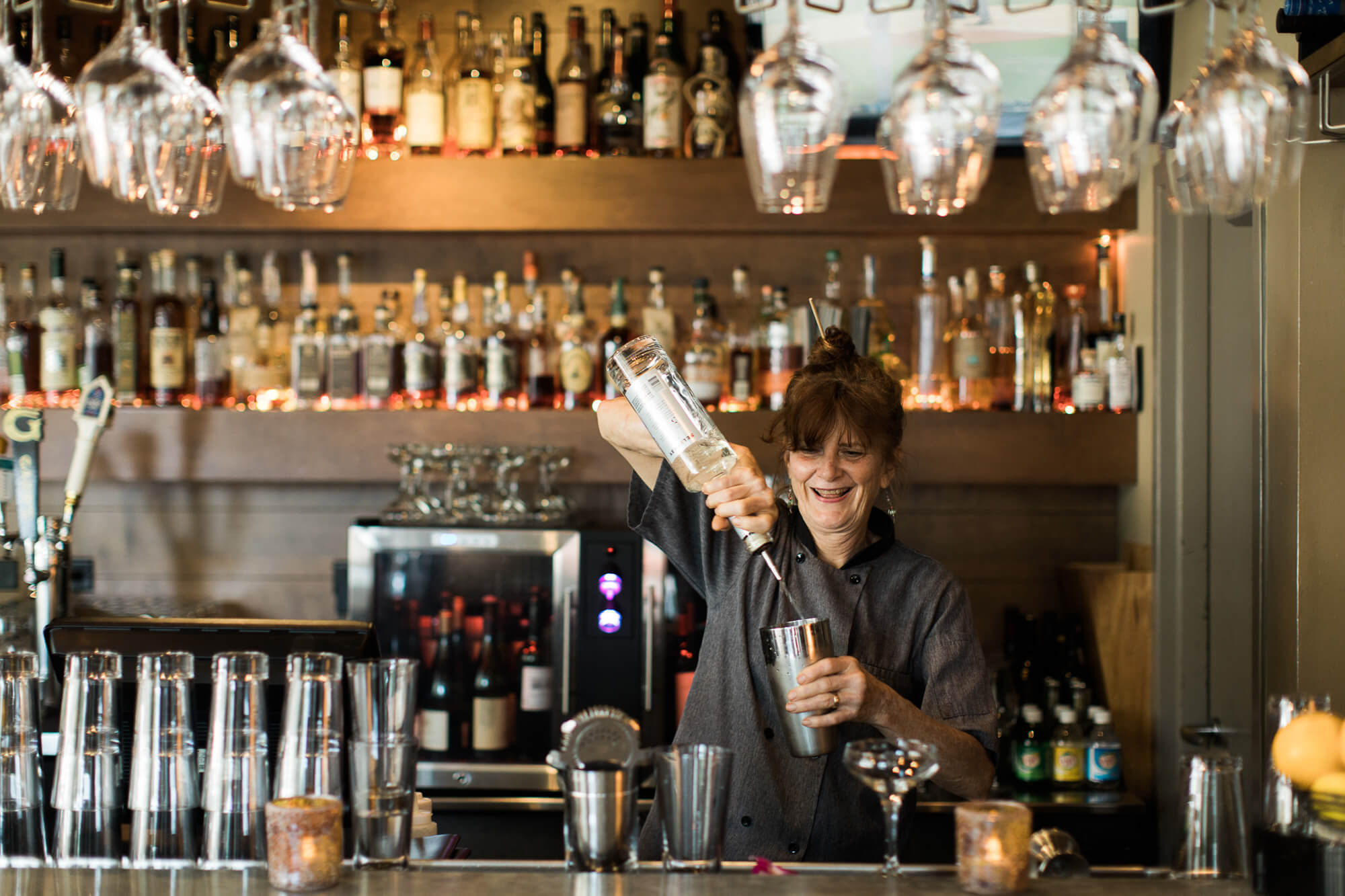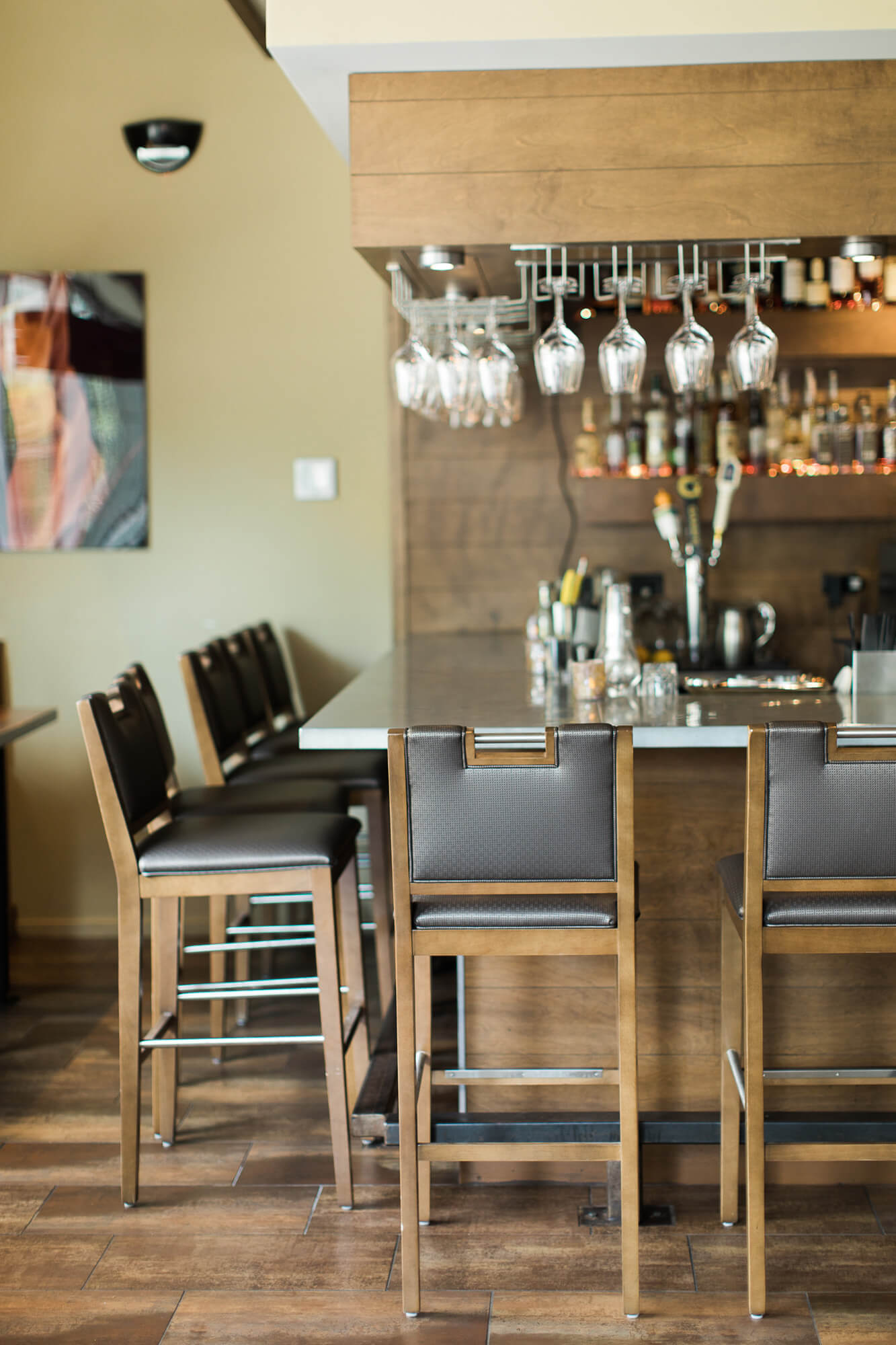Ask foodies across America about Nashville’s most famous chefs, and Deb Paquette’s might not be the first name you hear. But for more than 30 years, Paquette has trained and mentored countless chefs — and helped women succeed in a notoriously male-dominated industry.
Story by Ashlie Danielle Stevens | Photographs by Abigail Bobo
Chef Deb Paquette pulls a plump grapefruit from a plastic bin and — with a quick chop, a spin and another chop — removes both its ends, revealing a ruby center cobwebbed with threads of white pith.
“See, now you run the blade under the peel, following its curve,” she says, slowly working her way around the fruit. “And then …” Paquette juts her tongue against her cheek as she sinks the broad serrated knife into the fruit. She does this repeatedly along its natural vertical seams, while a growing pile of neat, crescent-shaped segments drop to the cutting board.
“We’ll get you a smaller knife for this, maybe some gloves, too,” Paquette says, glancing at my untrained hands. “During a real service though, you’d just have to work with what you got.”
It’s 2 p.m. on a Saturday. Dinner rush at Etch in downtown Nashville won’t start for another few hours, so for now — with my purple surgical gloves and mini-knife — I’m just prepping grapefruit, listening in, and trying to stay out of everybody’s way.
The industrial appliances in the open kitchen hum softly, punctuated only by the intense sizzle of thick slabs of lamb on the grill, my clumsy chopping, and Paquette’s pointed questions as she checks in on her cooks: What is that random scrawl on the prep list supposed to say? Has the produce arrived for the day? Did she forget her bag of eggplant in her truck? Yes, she sees there’s garlic oil on the stove — but there’s also three gallons in the walk-in, so maybe time could be better spent doing something else?
In reply, there’s none of the conditioned, almost-breathless “Yes, Chef! No, Chef!” we’ve come to expect from fine dining. Her cooks call her Deb, Miss Deb, Chef Deb (though never Debbie). She doesn’t seem to mind.
“You know, some people call me ‘the crazy lady,’ some people call me a bitch — I don’t care about that,” Paquette had told me earlier in the day. “But a bunch of my cooks, they call me ‘Momma.”
When I first met Paquette last year, she’d recently turned 60. It was a sticky-hot August day, and I was in town for a food expo. While there, a friend told me I had to meet the “godmother of Nashville’s food scene.” Soon after, I made my way to Green Hills, an affluent suburb near downtown, where a smaller, sister restaurant to Etch — called Etc. — was under construction.
My friend didn’t offer much information about Paquette. I was told only that she’d stepped into her first Music City kitchen more than 30 years ago. It’s why I expected someone a more little matronly (even grandmotherly), and definitively Southern.
Let’s clear one thing up right now: Deb Paquette is unlike your — or at least not like my — Southern grandmother in the kitchen. When I arrived that day at Etc., she was swigging Smirnoff Ice out of a brown paper bag while hollering at the construction workers who were putting the finishing touches on her bar.
We sat at a corner table while men in hard hats hammered a few yards away. She briefly told me how, now that she’s reaching the age where most people start thinking about retirement, she’s having to suss out where she fits in her own kitchen: “I still work with the people, I still work with the kids, I still correct them, and I still have to encourage. That’s my main role now. I call myself ‘middle school.’”
But many nights, she still works the line, slicing, seasoning, and plating alongside cooks less than half her age.
She doesn’t fit the stereotypical mold of the top Southern chef in 2017. Most of the national attention being given to Nashville and its “It City” status centers on young men doing Southern food — Sean Brock, Tandy Wilson, Andy Little (though there’s no denying they deserve it). Meanwhile, Paquette has two grown sons and has had to fight sexism for most of her career.
And then there’s her food.
She slipped me a draft of her menu, and where I expected grits, there were tempura beets. Where I expected fried chicken, there were panko-crusted duck gizzards with sambal peach jam. Big, global flavors — the kind that, per Paquette, “make your tongue do the Watusi.”
Six months later — the morning before Paquette sets me up to prep grapefruit — we’re sitting at that same corner table in Etc. The bar is now complete, and all the tables are cloaked in black cloths and topped with tiny, emerald succulents.
“Even though we grew up on middle-class food, it was big flavor,” Paquette tells me between sips of coffee. She’s drinking it out of one of those fat, plastic, deli containers you see packed with potato salad or slaw. It’s not too strong — she cuts it with both water and cream — but she nurses it all day to prep for dinner service.
“It was always plenty of salt, seasoning, you know,” she says. “No wussy food at our table.”
That’s what sparked her interest in exploring food as a career. Paquette, who spent most the first 25 years of her life in Ft. Lauderdale, Fla., attended school in Tallahassee at Florida State University. While at FSU, she found a list of cooking-based jobs in a friend’s car.
“His sister had been in his car, and she went to the CIA (Culinary Institute of America) and there was a list of all these jobs you could have when you got out of school, and I thought, ‘This is too cool,” Paquette says. “My eyes were way open. I came home and asked my mom and dad if I could go to cooking school, and somehow they pulled it off.”
After attending culinary school, Paquette returned to Ft. Lauderdale to take a job as a resort banquet chef, which is where she met her husband, Ernie, who also worked in the banquet department. These were the days, Paquette reminds me, when staff was still expected to wear checkered pants, white coats, and starchy, tall toques.
“It was probably 6 in the morning, and we were doing a big breakfast, and I wasn’t ready to put that piece-of-shit white hat on — I hate those hats — and my hair was down, and it was like, bleach blonde because I was always at the beach,” Paquette says, patting her now-red locks, which are twisted in a messy bun.
Ernie was smitten.
He returned to the banquet facility and asked about the new girl in the kitchen with Farrah Fawcett hair.
“They’re like, ‘There’s no new girl,’” Paquette says. “And they go — they called me Debba-Deb — that’s Debba-Deb.’”
Soon, the pair were dating. And when she moved several months later for a hotel restaurant job in Knoxville during the 1982 World's Fair, he eventually followed. The World’s Fair job didn’t work out — the event was kind of a bust and there was a hiring freeze — so Paquette took a job at a Nashville restaurant soon after.
In 1997, after over a decade of working in other chefs’ kitchens, she opened her first restaurant, ZOLA; that same year, the Middle Tennessee Chef’s Association awarded her both chef and restaurateur of the year.
The rest, she says, is history.
“Well, my history, and it’s mostly been in my business,” Paquette says. “For that reason, I have the highest praise and accolades for my husband because he had the kids in the nighttime, you know, for 18 years.”
Paquette is only half joking when she tells me she’s surprised Ernie has stayed with her for so long.
“He wanted kids, and sure, I wanted kids — but if it was to never happen, I would have been fine because I knew what I was choosing for a living and that it was going to be hard,” Paquette says, draining the last of her coffee.
But kitchen life was hard in ways she didn’t anticipate, and often in ways her male coworkers didn’t experience. A lot of that had to do with Paquette ultimately deciding to have children.
Paquette recalled the time a chef for whom she was working wanted to retract a raise he’d offered after finding out she was getting married (“He was worried I’d get knocked up”). Then, there was a time she miscarried while working in a different kitchen under another male head chef. Paquette returned from sick leave to no job.
“He was worried I’d get knocked up again.”
She spent hours on her feet — always in big, orange boots because of her low arches — while heavily pregnant. Then, eventually, there were the school performances she couldn’t make, the bedtimes she missed, the holidays she couldn’t take off.
“It was hard to be a mom in this business,” Paquette says. “I asked my son about eight months ago, and said, ‘Did you think Mom was, you know, a bad mom because I wasn’t home?”
In response, Paquette says, he laughed and said he’d never even thought about it.
For her women cooks, she’s tried to set up better systems. It starts in the interview process, by ensuring that any male candidates understand they are coming into a woman’s kitchen.
“In the interview, I tell them, most of my staff are women — are they going to be OK with that?” Paquette says, pointing forcefully at an imaginary job candidate in the chair across from her. “Are they going to be OK taking orders from women? Most say, ‘Oh, yes, ma’am.’ And the ones with an ego, well, they don’t stay too long.”
Paquette pays close attention to the needs of new parents — both moms and dads — who work in her kitchens. She gives them as much time off as she can. She talks them through how they can manage their time, something she believes is difficult but possible with children.
“It’s necessary, you know, now that my kitchen kids are having kids,” she says. “In my own life, I had a lot of guilt. I tried to take off any days I could, plan around their school projects, and always be home on Halloween.”
Halloween was important in the Paquette household. Up until her sons graduated high school, she made every single one of their costumes. One year, she dressed her oldest son up as “Beano Boy.” She used eyelash glue to cover his face in dried beans, and he carried a whoopee cushion. Another year — right before the 1996 presidential election — she dressed her youngest son in black leather biker boots, a tie-dyed shirt, and taught him to greet the candy holders with the phrase: I’m Bob Dole’s illegitimate son.
Paquette gets a far-off look in her eye: “God, there were so many costumes …”
Todd Gillam was one of those male staffers in a kitchen full of women.
“I was one of the only men in the kitchen, there were a lot of ladies,” Gilliam says. “And that in and of itself is a different experience, especially 20 years ago.”
Gillam met Paquette once he moved to Nashville after serving in the U.S. Navy; he knew he wanted to attend culinary school, but needed some time to save money and gain some professional experience. He was living in Sylvan Park, right across the street from Tin Angel and Cakewalk, where Paquette was working at the time.
“And I just walked in and asked for an application, sat down with her, and she hired me on the spot,” Gillam says. “And, to this day, she’s really one of the best chefs I’ve ever worked with. Her hummus recipe can’t be beat, her baba ganoush can’t be beat. She was doing stuff 20 years ago that is normal now, and then it just wasn’t, you know what I mean?”
Gillam ended up going to the Culinary Institute of America (though he returned to Nashville to intern for Paquette), and then moved to work in upstate New York for several years. He still uses many of her recipes.
“Ask anybody in Nashville about Deb,” he says. “Anybody. And they’ll have a story.”
For his part, he has lots of memories from his roughly three years working with Paquette, and I can practically hear the wink when he tells me, “Here’s my favorite that you can actually put in print.”
“I needed a recommendation for school. They wanted a reference,” Gillam explains. “And some people don’t even do it, you know? Some people say they will, and they don’t, but she immediately typed something up and slipped it under my door at the house.”
Gillam still remembers unfolding the freshly typed document.
“And it just said, ‘Todd can’t cook his way out of a paper,’” he says, chuckling. It detailed how he was beaten up by all the women cooks in the kitchen.
“There’s references to estrogen and all these things,” Gillam says. “It’s hilarious. It’s just hilarious. And then, of course, later she gave me the real letter of recommendation. But I still have that first one somewhere; I should dig that out.”
Gillam is back in Nashville now, working as the executive chef at Vanderbilt University Medical Center’s Courtyard Café.
“Yeah, I went corporate about 10 years ago,” he explains. “I’ve got kids now, and just with the schedule … well, you know how it is.”
While I’m prepping at Etch, I remember something Paquette told me: “You know that saying, ‘There’s no crying in baseball?’ Well, there’s no crying in the kitchen either.” I want to cry, though, as I watch my knife cuts reduce the firm grapefruit into pulpy, lopsided orbs. I’m able to get some decent segments from them, but nothing like the uniform, salad-ready portions Paquette demonstrated.
When she comes back by my workstation, I’m separating stringy, sticky remains from hunks of fruit with my hands.
“Honey, don’t even worry about it,” Paquette says, sweeping the leftover peel into a nearby trashcan. “Those were shitty little grapefruit, anyway. We’ll be able to make it work. But here’s another trick for the last few.”
She guides me through the process of cutting more precisely into the heart of the fruit at an angle. Quick slices, avoiding scooping. There was no shouting, no ranting — just a little encouragement and instruction. The next grapefruit I do isn’t perfect; bungled angles remain. But overall, it’s better.
In that moment, I feel like one of Deb Paquette’s kitchen kids, and I understand why they call her “Momma.”















